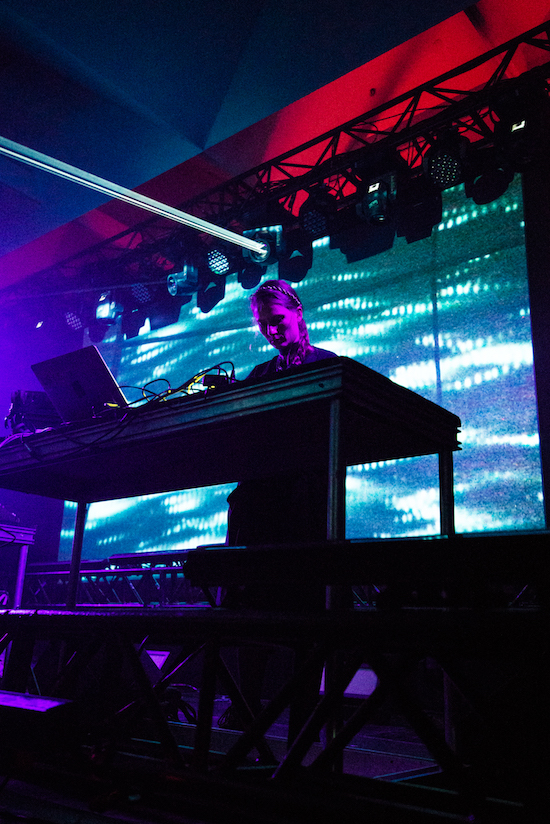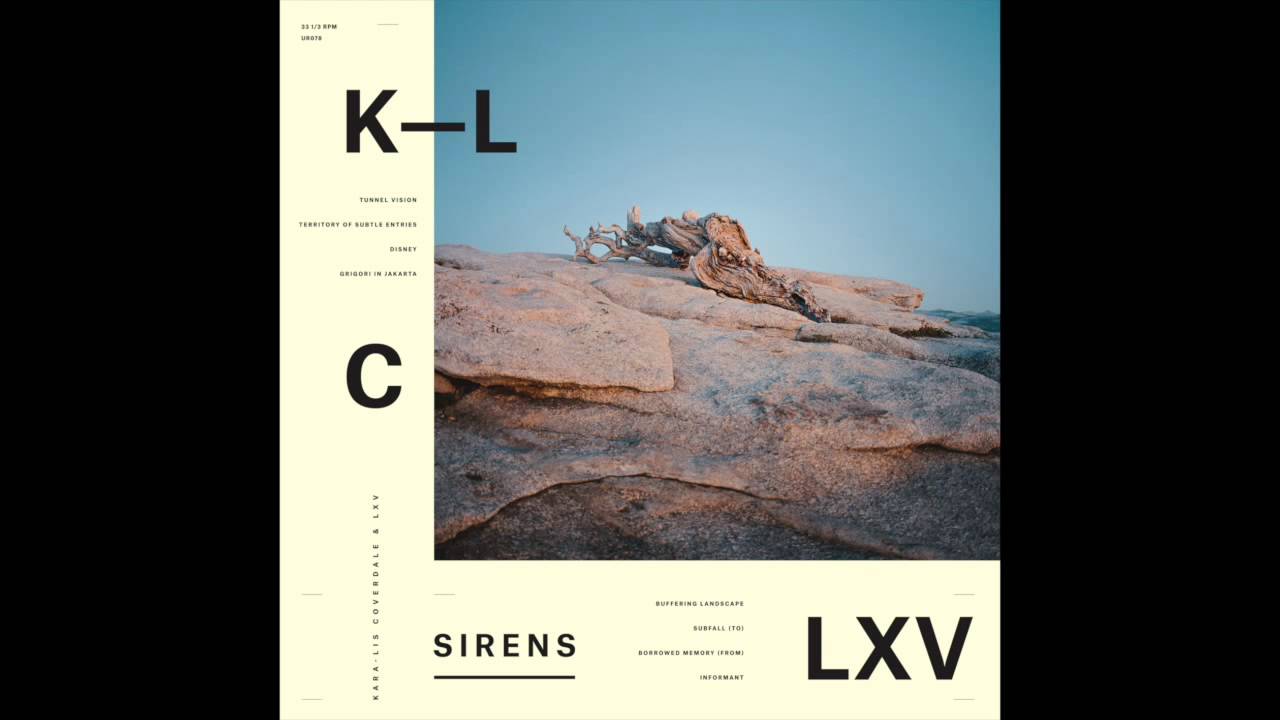It’s pouring rain as I step off the metro to meet Montreal musician Kara-Lis Coverdale. A Biblical jungle carwash kind of rain. The heavens have opened up and pelt the sidewalks with raindrops the size of anvils and grand pianos. I think to myself, this could be it. The end. We might have to find an ark. Or worse, build one.
Fully saturated, I duck into the Musée d’art contemporain’s basement, where Coverdale is finishing an interview with NTS Radio. They are broadcasting remotely from Mutek’s 17th edition HQ. We choose Bar à vin Place Deschamps, mainly because it’s right there — a dark wine cellar adjacent the MAC, in the cavernous underground tunnels of Place des arts. We take a table for two in the hull.
Two nights previous, Coverdale plays the Mutek festival. The room is about three quarters full. In the front few rows, the most reverent spectators sit on the floor, entranced. Behind them, a modest crowd of festivalgoers stands evenly spaced and more-or-less at attention. Most listen. Some check their phones. Others chat, and dutifully drop empty beer cans into a recycling bin by the bar. A security guard yawns and shuffles his feet. It’s a wide spectrum.
Meanwhile, sheets of electronic sound flap through the space. I struggle to not be swayed by its beauty. It’s a tempting oversimplification to make: the music is beautiful, but that’s only part of what’s happening here. It’s also composed, complex, unpredictable, staccato and violent at times. But a delicate thread runs through it. That’s what makes her compositions so familiar and utterly unique at once — imagine Maggi Payne meets pre-Warp era Oneohtrix Point Never.
I loiter near the soundboard. I look up and see that I’m standing directly beneath an enormous speaker rigged from the ceiling. Coverdale is now vibrating every corner of the room with corpulent drones, anything not screwed down rumbles sympathetically in long and low waves. I move out of harm’s way.
Along the walls and behind the stage, digital projections of galaxies ebb and pulse in tottering rhythm. Making sounds to launch a thousand spaceships, Coverdale’s star is rising.
Writing in The Wire, Maya Kalev characterises her emerging body of work as “truly compelling music”, guided by “an omnivorous approach to sound”; Jordan Darville at The Fader says it’s about “heady concepts distilled into accessible pieces”; Thump’s Michael Rancic calls them “luminous compositions”: “focused, but bubbling over with ideas”; Russell Smith of The Globe and Mail maintains that it’s “more cerebral”; “almost cinematic”, Amy Greif of BlogTO brands it; it’s “profane music”, says The Guardian’s Ben Beaumont-Thomas, filtered through “the traditional repertoire of the church” — apt, given Coverdale’s history as a classically trained pianist, and recently retired (at age 29) church organist.
She’s an in-demand collaborator, too, contributing to Tim Hecker’s two most recent albums, and working in 2015 with Lee Bannon and LXV. Still, it is A 480 and Aftertouches, Coverdale’s sought after solo cassettes that have landed her spots at prestigious international festivals like Convergence, Intonal and Mutek.
Back at the wine bar, Coverdale and I sit on couches in the far back corner. We wait for the waiter and talk about her Mutek set. “I like playing festivals,” she tells me. “I’ve played in a lot of churches. I’ve played in a lot of basements. You have a festival to create magical moments. Musically, I felt pretty good about it.”
In a week’s time, Coverdale will play Unsound in Toronto in collaboration with visual artist Marcel Weber, aka MFO. She describes how Weber’s work camouflages her performance.
“Camo is exactly what I need for my physical form on this earth,” she says. “I don’t need to exist as a person. I think there’s a time and place to be front and centre, but at the present moment, it’s all about the disintegration of the body. It’s not about a celebration of it.”
“I don’t want any visuals of me to be broadcast, ever,” she says. “I’m coming from an acousmatic tradition of listening all in black, so you can abandon one sense in order to amplify another.” I nod.
The waiter makes an appearance. “What do you recommend,” she asks. He evades the question. “It depends on what you want.”
We order a haphazard combination of tapas — marinated mushrooms, pickled fennel, spiced Brazil nuts — and a bottle of pinot gris. “I hate it when they do that,” Coverdale says, referring to the waiter’s deferral. “You can draw a lot of information from my posture, body language, what I’m wearing. Come on. What do I want to eat?”
Coverdale is dressed in a black cloak and leaning over the guardrail next to our table. She speaks into my iPhone and watches her voice make waveforms in real time.
I discover that we have a lot in common: a love of Eastern European sacred music; a fascination with music technology; childhood Royal Conservatory piano lessons.
“RCM all the way!” she exclaims, high-fiving the air. “I’ve always been a really good student,” she boasts. “We need to study music. Why not? Why wouldn’t you want to get smarter? Discipline is a central component to any success.”
I’m curious about the instruments she uses to make her work.
“Mostly virtual sources,” she says. “FM synthesis; VSTs. If there are samples, they’re heavily — I want to make up a new word here — holographasised. Almost to the point where there is no origin. My instrument is the sound system.”
“But how much of it is performed live?” I persist.
“This line means nothing to me,” she says flatly.
“A DJ is like a performer since the dawn of time. Music is a replication of another sound, and another sound, and another sound. It’s just a different medium.”
“I’m not an Ableton Live user,” she explains. “I don’t trigger a loop. I spend twenty-four hours for four minutes creating a trajectory that’s impossible to redo in a live setting.”
“It’s like asking an architect to build a building in front of someone’s eyes. It’s impossible. I can add something to the building. I can add a sash to it, or maybe tint the windows, but I cannot build the building.”
This year, Mutek has made a mission of booking a fair number of female artists: twenty-seven women across eighty-two performances. I nudge toward this and she strikes preemptively: “’What it’s like to be a woman in electronic music’ is a question of 1970, not 2016.”
“How does one make a macho set anyway?” she asks rhetorically. “I want to make a macho set. I’ve been trying to make it more aggressive, but people just end up saying it’s beautiful.” She shakes her head.
“I don’t understand. Some of my noise samples are hard as fuck. The high-end stuff is damaging. And then people are just like, ‘it’s beautiful’.”
“A lot of people make beautiful music, not just women,” I say.
“Yeah, like Arvo Pärt. This is something I’m constantly obsessed with,” she admits. “Cold and mechanical I would say is more my thing. But still, people think it’s beautiful. When you listen to someone’s music, you impose your own biases on it. You hear what you want to hear.”
“It’s not a feminine expression,” she clarifies, “it’s an academic expression. Often times when I’m making music, I’m much more happy with it if it has conceptual feet than if it’s just felt and played. I don’t feel like I have anything to do with the music. I’m like a transformer, or a transmitter. I’m like a wi-fi box — a wi-fi box with a scrambler in it. I’m like an A.I.” But I don’t find Coverdale’s intelligence artificial.
Time passes. We drink our wine and nibble on our weird array of tapas. A mushroom accidentally rolls off her plate and bounces to the floor. She swoops it up and pops it without hesitation into her mouth. “Still good,” she shrugs between chews. “Look how clean this place is.” For some reason, this really impresses me.
“Do you like pop music?” I ask.
“I’m extremely open to pop music. I just finished a track for How To Dress Well. So honoured. Super happy too. I see no place for snobbery.”
“What if Kanye West came along tomorrow and asked you to…”
“Yes.”
I don’t even have to finish the question.
“What do you enjoy about collaboration?”
“The work becomes more complex and enriched,” she tells me. “Your blinders become removed. If you can allow that to happen, it just means you’re a really receptive personality.”
I quiz her: “Who do you dream of collaborating with?”
“Young Thug. Drake. Ariana Grande. I love Justin’s new work.”
“It comes back to basic conversational etiquette,” she says. “If someone speaks to you, you speak back. Why would you want to go on your own? If someone else in the musical world can do something better than you can, then you should let them do that.” I agree.
Outside, the rain has slowed to a drizzle. It’s not the end and no ark necessary. We stand in Place de la Paix, a large empty square opposite the Société des Arts Technologiques, wondering whether or not to venture inside. Martyn is playing a Boiler Room-sponsored set.
Coverdale uses my umbrella against the remaining raindrops. It’s a large navy blue parapluie that I stole from the Intercontinental Hotel. She twirls it around like a baton. “This umbrella has a really nice weight to it,” she says. I always find it promising when artists appreciate a well-made piece of technology. Any technology.
Inside, the music pumps on predictably. A sweaty and tired Sunday night crowd dances while an MC shouts stupid hype over the sound system. Coverdale stands staring straight upward at the psychedelic screen-saver visuals on the SAT’s concave ceiling. Privately, I wish she were the one performing. No one else can quite touch what she’s doing right now.





